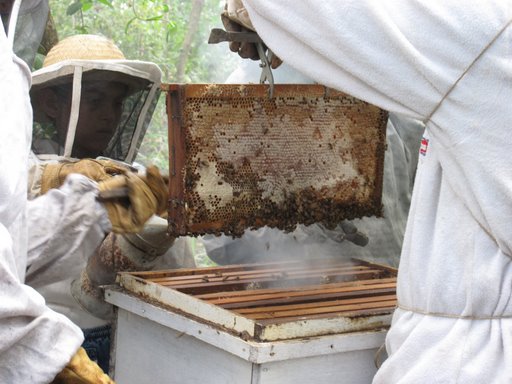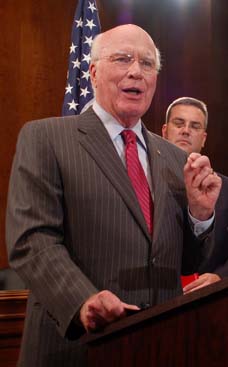
Farmers in Paraguay, one of the poorest countries in South America, are finding it harder and harder to make a living in the countryside. Jobs are few and far between in the cities. More and more Paraguayans are working as maids or construction workers in Spain and Argentina. Beekeeping is one way to make money while at the same time improving the small-scale farm. The start-up costs are minimal, there is a constant demand for honey, and considering the labor involved, the profit is high. Beekeeping is beautifully economical -- there is no waste. The propolis and pollen that bees make can be collected and consumed. The leftover wax can be made into candles, soap, or ointment. The hive itself can be made out of milk crates or scrap wood.
Mary Cinadr is a Peace Corps volunteer serving as a small-business adviser and beekeeper in Paraguay
A better life through bees in Paraguay
Email|Link Posted by Lydia Rebac July 15, 2009 05:45 AM
Caption: Beekeepers inspect a panel from a manmade hive, heavy with honey and ready to harvest. Jonny Lopez (below) prepares for a hive inspection. (Photos by Mary Cinadr)
Mary Cinadr, a former Cambridge resident, is a Peace Corps volunteer serving as a small-business adviser and beekeeper in Paraguay.
By Mary Cinadr
PUEBLO-RA, Paraguay -- White suits plod through thick forest until the faint hum becomes a distinct buzzing. A candidate for a wild hive capture is located. The task: to transfer the entire hive to a manmade hive -- a wooden box with 10 panels inside. This wild hive is in a tree 30 feet up, and so an invention is born. A long straight branch is used to spear a termite mound, about 3 feet in diameter, like a marshmallow that is then lit on fire. Smoke envelops the treetop hive. Below, the tree is chipped away by machete, until it falls, slow motion, to the ground. The rest is fast motion. Disoriented bees scatter and the smoke of burning termites fills the air.
With the beekeepers on hands and knees, the search for the queen begins. The capture and relocation of the queen attracts the workers to the manmade hive, where she will be placed in a matchbox, dangling from a string in the hive's center panel. Upon first sniff of the queen, dutiful worker bees begin chewing the matchbox, trying to free her, while others file in and set up camp.
A handful of leafy branches makes a brush, which is dipped into the mounds of bees that have not yet decided to move into the new hive, while others are scooped up by gloved hands and plopped inside. The buzz of more than 60,000 Africanized honey bees brings both a rush and a calm, making the 110-degree heat less noticeable.
In a few weeks there will be the reward of lifting a heavy panel up to find it full of fresh, golden honey.
Back at the cooperative, veils are lifted, and steam rises from stomachs into thick air. The white goop of larvae drips from knives to the tops of sneakers. Fingernails scrape stingers from the backs of necks and soothing onions are applied. The heat lurks, like a big man blowing stale, hot breath. Children swarm to the honey bucket, devouring huge pieces of honey in the comb - the leftovers from the capture.
boy%20beekeeper
Beekeepers in Pueblo-ra, Paraguay, get hushed calls at all hours from unknown numbers: "Tienes miel pura?" in Spanish or "Nde rerekopa eira pora?" in Guarani. Everyone wants the pure stuff, and because of rampant tampering, pure honey doesn't last long on the market.
Four years ago, in the 22-house village of Pueblo-ra (Guarani for "pueblo to be"), farmers discovered beekeeping to be a lucrative practice that does not compete for other resources, increases crop production, aids in nutrition, and fetches a decent price in the market. Honey is valued for its nutritive qualities. Doctors prescribe honey for various illnesses, and it is found at all pharmacies. It is also sold among neighbors, on the street and in the mercado.
Farmers in Paraguay, one of the poorest countries in South America, are finding it harder and harder to make a living in the countryside. Jobs are few and far between in the cities. More and more Paraguayans are working as maids or construction workers in Spain and Argentina. Beekeeping is one way to make money while at the same time improving the small-scale farm. The start-up costs are minimal, there is a constant demand for honey, and considering the labor involved, the profit is high. Beekeeping is beautifully economical -- there is no waste. The propolis and pollen that bees make can be collected and consumed. The leftover wax can be made into candles, soap, or ointment. The hive itself can be made out of milk crates or scrap wood.
There is still a ways to go, however, in dispelling myths about the dangers of bees and educating the community about how to keep bees in a safe, sustainable way. There is a general fear of being stung, and stories spread far and wide about bee-sting disasters, mostly as a result of honey-robbing without proper equipment. There are three ways to interact with bees: bee-killing (robbing the hive for honey once or twice a year, thereby leaving it with no food source), bee-having (having bees in a box without any knowledge of how to care for them to produce optimal results), and beekeeping, which is the most ideal practice, involving basic maintenance and a general understanding of how to care for a hive.
In an effort to boast about honey's qualities and impart more knowledge of bees, I teach a beekeeping class for children in Pueblo-ra. We do sugar vs. honey taste tests. "Which one tastes better?" I ask a circle full of young children? "This one!" they respond, pointing to the honey. Above the ground, their little legs swing back and forth in their chairs. We list the foods we produce in town and how we produce them. I ask them to tell me what they think of bees. I ask them if they know where we keep our hives and if they've ever heard the buzzing from them. We do skits about the queen, all her suitors and workers, and the way bees make their magical recipes, like honey, propolis, pollen, and royal jelly.
Maria, our first female beekeeper, told me that her 6-year-old son Carlos came back from class one day and said he wanted to be a beekeeper. "OK, my child, my little beekeeper,'' she said. "I will make you a bee suit."
Maybe the fierce curiosity and appetite for honey will lead these children to work with bees. Maybe the honey they make will bring in some much-needed money. Maybe they will then resist the temptation to flee for a job in a big city or another country, and instead, stay on the family farm or start one of their own. Maybe the possibility exists for this small, 22-house community to be truly sustainable. And if the people here learn to care for what's in their own backyard, Pueblo-ra ("Pueblo-to be") may have to come up with a new name for itself.













